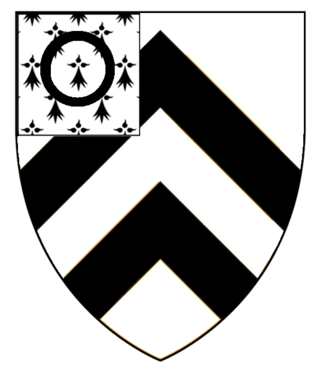Related Research Articles

Sir Gilbert Heathcote, 1st Baronet was an English merchant and Whig politician who sat in the English and British House of Commons between 1701 and 1733. He also served as the governor of the Bank of England and was Lord Mayor of London in 1711.

Sir Isaac Penington was an English politician who sat in the House of Commons from 1640 to 1653. He was Lord Mayor of London in 1642 and a prominent member of Oliver Cromwell's government.
Sir William Withers of Fulham, Middlesex, was an English linen draper and Tory politician who sat in the English and British House of Commons between 1701 and 1715. He was Lord Mayor of London from 1707 to 1708.
Sir John Norreys was a high ranking Lancastrian, and the head of the branch of the Norreys family who became prominent under the reign of the House of Tudor. He served as Keeper of the Wardrobe for King Henry VI of England.
Sir John Rivers was a Tudor-era businessman who became Lord Mayor of London.

Alderman David Henry Stone. His family were the owners of a large amount of land near Lewes for at least three centuries. He was the nephew of Thomas Farncomb the Lord Mayor of London of 1849. Educated at St Olave's Grammar School, in Southwark. He practiced as a solicitor and an attorney from 1839 until 1864.
George Heathcote was an English merchant and philanthropist and Tory politician who sat in the House of Commons from 1727 to 1747. He was Lord Mayor of London in 1742.
Walter Bigg was an English merchant and politician who sat in the House of Commons in 1659.
Sir Robert Lee was an English merchant who was Lord Mayor of London in 1602.
Sir John Gore was an English merchant who was Lord Mayor of London in 1624.

Thomas Canynges was an English politician who served as Lord Mayor of London from 1456 to 1457.
Sir Thomas Scawen was a British merchant, financier and Whig politician who sat in the House of Commons between 1708 and 1722. He was Governor of the Bank of England from 1721 to 1723.
Sir George Champion (1713-1754) of St Clement's Lane, London, and Baulking, Berkshire, was an English merchant and politician who sat in the House of Commons from 1734 to 1741. He was notably passed over for the role of Lord Mayor of London.
Sir John Ward, of Hookfield, Clay Hill, Epsom, Surrey and St Laurence Pountney, London, was a British merchant, banker and politician who sat in the House of Commons between 1701 and 1726. He was an original Governor of the Bank of England and served as Lord Mayor of London in 1718.
Sir George Bond was a 16th-century English politician who served as Lord Mayor of London in 1587/8. A native of Somerset, he was the younger son of William Bond of Buckland and younger brother of William Bond, alderman and Sheriff of London. He was a member of the Haberdasher's Company. Prior to becoming mayor, he was elected as Sheriff of London in 1579 and alderman of Walbrook in 1584. At the time of his election in 1587, the usual Mayoral Feast was cancelled, on account of plague within the city of London.
Edward Ironside was a British banker and Lord Mayor of London in 1753.
Sir Edward Clarke, of Brickendon, Hertfordshire, was an English merchant who served as Lord Mayor of London in the year 1696 to 1697.
Nicholas Wotton was an English merchant and official who twice served as Lord Mayor of London, in 1415 and 1430.

Stephen Browne was a grocer, alderman of London, a Member of Parliament for London and Mayor of London.
Sir John Tash was a leading wine merchant in London in the early eighteenth century. He was alderman for the ward of Walbrook in the City of London and a sheriff of London in 1720.
References
- 1 2 3 4 Beaven, the Rev. Alfred B (1913), The Aldermen of the City of London, vol. II, London: Eden Fisher & Co. Ltd., retrieved 12 December 2017
- 1 2 3 Hasted, Edward (1798), "Parishes: East Peckham", The History and Topographical Survey of the County of Kent: Volume 5, Canterbury: W Bristow, pp. 91–106, retrieved 12 December 2017
- ↑ Beaven, Alfred P (1908), "Aldermen of the City of London: Walbrook ward", The Aldermen of the City of London Temp. Henry III – 1912, London, pp. 216–224, retrieved 12 December 2017
{{citation}}: CS1 maint: location missing publisher (link) - ↑ The History of Parliament: the House of Commons 1509-1558 , retrieved 12 December 2017